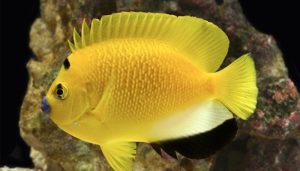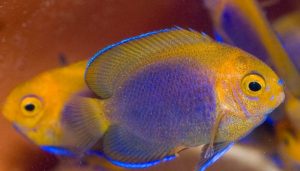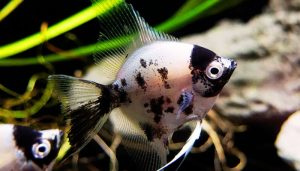Guppies are among the most popular freshwater aquarium fish, known for their vibrant colors and playful personalities. However, guppies are susceptible to various illnesses, including dropsy, like all living creatures. Dropsy Guppy disease, also known as “pinecone scales,” is a serious situation that can be fatal if left untreated.
Dropsy guppy is an illness that affects the fish’s ability to regulate fluids, leading to fluid accumulation in the body and tissues. Bacterial infections, environmental stress, or poor aquarium water quality cause the disease.
Although guppy dropsy disease can affect any tropical fish, guppies are particularly vulnerable due to their delicate nature.
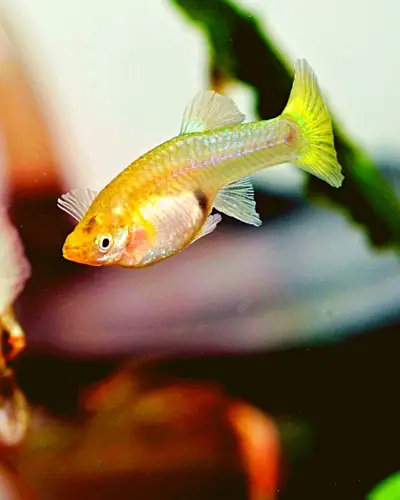
As a responsible guppy owner, knowing the causes, symptoms, and best treatments for dropsy guppy is crucial.
This blog post explores everything you need about dropsy, including its causes, symptoms, and the best treatment methods.
We’ll also provide practical tips on preventing dropsy from occurring in your guppy tank. So, don’t let your fish suffer; dive in and learn how to protect your beloved guppies from this devastating disease.
Table of Contents
ToggleUnderstanding Dropsy in Guppies
Guppies, known for their vibrant colors and playful nature, are popular aquarium fish among fish enthusiasts. However, they are susceptible to various health issues, including dropsy.
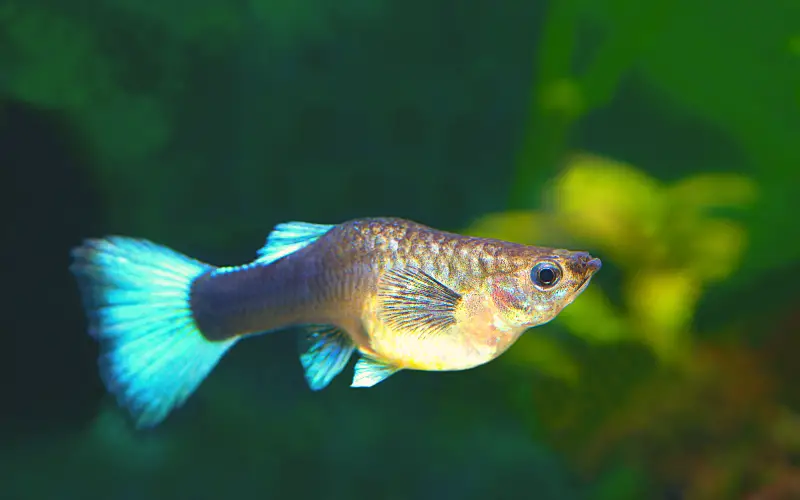
Dropsy refers to a condition that affects the kidneys and other vital internal organs of guppies, leading to fluid retention and swelling. In this definitive article, we will explore the causes, guppy dropsy symptoms, prevention strategies, and the best treatment options for guppy dropsy.
What Causes Dropsy In Guppies?
Multiple factors, including bacterial infections, poor water conditions, and underlying health issues, can cause dropsy in guppy fish. Understanding the causes is crucial for effective prevention and treatment. The following are the primary causes of guppy fish dropsy disease:
– Bacterial Infections
Bacterial infections, particularly those caused by Aeromonas, Pseudomonas, and Mycobacterium species, are common triggers for dropsy in guppies. These bacteria can enter the fish’s body through open wounds or compromised immune systems, leading to organ failure and fluid accumulation.
– Poor Water Quality
Maintaining a clean and healthy fish aquarium environment is vital for the well-being of guppies. Poor water quality, including high ammonia and nitrate levels, can stress the fish and weaken your fish’s immune system, making them more susceptible to dropsy.
– Underlying Health Issues
Guppies with pre-existing health conditions, such as liver disease or compromised kidney function, are more prone to developing dropsy. These underlying health issues can weaken the fish’s organs, making them more vulnerable to fluid retention.
Recognizing Symptoms of Dropsy in Guppies
Early detection of dropsy symptoms is crucial for prompt treatment. By observing your guppies closely, you can identify the following signs that indicate dropsy:
Swollen Abdomen
The most apparent symptom of dropsy is a swollen belly. Affected guppies develop bloating, giving them a pinecone-like appearance. This swelling belly is caused by the accumulation of fluids in the body.
Raised Scales
As dropsy progresses, the scales of affected guppies may become raised or pinecone-shaped. This condition, known as “pineconing,” clearly indicates organ failure and fluid retention.
Lethargy and Loss of Appetite
Guppies suffering from dropsy often exhibit sedentary behavior and a loss of appetite. They may become inactive, isolate themselves, and show disinterest in food.
Abnormal Feces
Dropsy can also lead to changes in the fish’s excretory system. Guppies with dropsy may have abnormal feces, such as stringy or discolored waste.
Is Guppy Pregnant or Has Dropsy?
If a guppy fish appears bloated and swollen, it can be challenging to determine whether the guppy fish is pregnant or has dropsy. Guppies are known for their ability to reproduce rapidly, so pregnancy is always possible. However, dropsy is a severe condition affecting many fish species, including guppies.
Dropsy is characterized by fluid retention, causing the fish to appear bloated and pinecone-like. The best way to determine if a guppy is pregnant or has dropsy is to observe its behavior and physical characteristics. If the fish exhibits signs of being gravid (carrying eggs), such as a dark gravid spot near the anal vent, it is likely a female pregnant guppy.
On the other hand, if the female guppies have a bloated abdomen accompanied by scales that stick out, it is more likely to have dropsy. Consulting with a veterinarian or a knowledgeable aquarist can help confirm the diagnosis and provide proper treatment.
Can You Treat Dropsy In Guppies?
Yes, dropsy can be treated in guppies, but it is important to note that dropsy is a sign of an underlying condition rather than a disease in fish.
Dropsy is characterized by the fish’s body’s swelling due to fluid cumulation in the abdominal cavity. Various factors, including bacterial infections, parasites, poor water quality, or other stressors, can cause it.
Preventing Dropsy in Guppies
Prevention is always better than cure when it comes to dropsy in guppies. By implementing the following preventive tips, you could significantly reduce the risk of dropsy in your guppies:
– Maintain Clean Water Conditions
Regularly test the water parameters of your aquarium and ensure they are within the appropriate range. Cleaning the filters and Performing frequent water changes to eliminate toxins, maintain proper pH levels, and minimize the risk of bacterial infections.
– Quarantine New Fish
Before introducing new fish to your aquarium, it is essential to quarantine them first. This practice helps prevent the spread of guppy diseases and infections to your existing guppies, reducing the chances of dropsy.
– Provide a Balanced Diet
A well-balanced diet is crucial for maintaining the overall health of your guppies. Feed your guppy high-quality tropical fish flakes food that meets their nutritional requirements. Avoid overfeeding, as excess fish food can lead to poor water conditions.
Best Treatment for Dropsy
When it comes to treating dropsy in guppies, early intervention is essential. Here are some effective dropsy guppy treatment options:
– Isolate and Quarantine the dropsy guppy fish
When you notice signs of dropsy in a guppy, isolate it from the main tank and place it in a hospital tank. This prevents the potential spread of bacteria and provides a controlled environment for treatment.
– Use Medications
Several medications can be used to treat dropsy in guppies. Consult a veterinarian or a knowledgeable fish keeper to determine the most appropriate medication. Antibiotics and medications that improve kidney function are commonly prescribed.
– Epsom Salt Bath
An Epsom salt bath can help reduce the swelling and discomfort associated with dropsy. Prepare a separate container with a diluted Epsom salt solution and gently place the sick guppy in it for a short period, following proper guidelines.
Can Guppy Fish Recover from Dropsy?
Guppy fish can recover from dropsy, although challenging and lengthy. Fish dropsy is a condition that affects the guppy’s kidneys, causing fluid to accumulate in its abdomen and making it appear bloated.
Dropsy is often caused by bacteria, making it a contagious disease that can spread to other fish in the aquarium. , it is essential to isolate the infected fish to prevent the spread of the disease. To help a guppy fish recover from dropsy, Medications specifically designed to treat dropsy caused by bacteria can be administered, but they may not always be practical.
In addition, regularly monitoring water conditions and maintaining a clean and healthy aquarium environment is crucial. Aquarium salt can also aid in recovery by reducing swelling and promoting the fish’s overall well-being. Patience, consistency, and proper care are essential for successfully recovering guppy fish from dropsy.
Recovering from Dropsy: Essential Tips
Recovering from dropsy can be a challenging process for guppies. However, with proper care and attention, you can increase their chances of survival. Consider the following tips during the recovery phase:
- Maintain optimal water conditions in the hospital tank.
- Provide a stress-free environment with low light and minimal disturbances.
- Administer prescribed medications as directed by a veterinarian or fish expert.
- Ensure the guppy receives proper nutrition to support its immune system and recovery.
- Monitor your guppy fish closely for any changes in symptoms or any abnormal behavior.
Should You Euthanize Fish with Dropsy?
Dropsy is a serious disease that affects guppies and other fish. It is characterized by a swollen abdomen and raised scales. When a guppy fish is in the advanced stage of dropsy, its chances of survival become very slim.
At this stage, euthanizing the fish may be the most humane option. Euthanizing a fish with dropsy prevents further suffering as the disease causes immense discomfort. It is important to note that dropsy disease is highly infectious and can spread to other fish in the tank.
Therefore, if one fish is suffering from dropsy, it is essential to quarantine it from the others to prevent further infections. Euthanizing a fish with dropsy also ensures the overall health and well-being of the other fish in the tank.
Is Epson Salt Good for Treating Dropsy?
Dropsy is a common ailment among fish keepers, characterized by the abnormal swelling of their fish’s abdomen. Many fish enthusiasts recommend using Epsom salt as a treatment for dropsy due to its potential benefits.
Epsom salt is believed to have a diuretic effect on fish, helping to reduce the excess fluid build-up in their body. It is said to aid in eliminating toxins and reduce the swelling associated with dropsy.
However, it is essential to note that Epsom salt is not a guaranteed cure for dropsy. It may only provide temporary relief and should be used with other appropriate treatments, such as antibiotics or proper water quality management. Consultation with a veterinarian or experienced fish keeper is highly recommended when treating sick fish.
Dropsy Guppy Commonly Asked Questions (FAQs)
Is dropsy disease contagious to other fish?
Yes, dropsy can be contagious to other fish, primarily if caused by a bacterial infection. Isolate the affected fish and monitor others closely for any signs of illness.
What is the best treatment for dropsy in guppies?
The best treatment for dropsy involves isolating the affected fish, administering appropriate medications, and providing a balanced diet. Consult with a pet fish veterinarian or fish expert for specific treatment recommendations.
Can dropsy be cured completely?
While dropsy can be challenging to cure, early detection and prompt treatment increase the chances of recovery. However, the prognosis depends on various factors, including the fish’s overall health and the underlying cause of dropsy.
How can I prevent dropsy in my guppies?
To prevent dropsy, maintain clean water conditions, quarantine new fish, provide a balanced diet, and regularly monitor your guppies’ health. Prevention is critical to minimizing the risk of dropsy.
Can dropsy in guppies be caused by constipation or swim bladder disease?
Constipation and swim bladder disease can contribute to dropsy in guppies. These conditions can lead to organ dysfunction and fluid retention if left untreated.
What is dropsy in guppies?
Dropsy in guppies is a disease that affects the fish’s kidneys and causes fluid retention, leading to bloating and swelling of the abdomen. It is a severe condition that can be fatal if left untreated.
Is dropsy contagious to other fish?
Yes, dropsy is contagious to other fish. It is caused by a bacterial infection that can spread to other fish in the same tank if proper quarantine measures are not taken.
What are the early signs of dropsy in guppies?
The early signs of dropsy in guppies include bloating, abdominal swelling, raised scales resembling a pinecone, loss of appetite, and lethargy.
How can I tell if my guppy is suffering from dropsy?
To determine if your guppy is suffering from dropsy, look for symptoms such as bloating, swelling of the abdomen, raised scales, loss of appetite, and lethargy. If you notice these signs, it is crucial to take immediate action.
How do I treat dropsy in guppies?
The best treatment for dropsy in guppies includes isolating the affected fish, maintaining good water quality, providing proper nutrition, and using salt treatments or medication as an expert fish keeper recommends.
Can dropsy in guppies be cured?
Dropsy in guppies can be treated and cured if caught early, and appropriate treatment measures are undertaken. However, it is essential to note that dropsy is a severe condition, and not all cases will have a successful outcome.
How much Epsom salt should I use in treating dropsy in guppies?
When using Epsom salt to treat dropsy in guppies, adding 1-3 teaspoons of aquarium Epsom salt per gallon of water in the separated tank is recommended. However, it is essential to consult with an expert fish keeper or veterinarian for the appropriate dosage based on your specific situation.
Can constipation cause dropsy in guppies?
Yes, dropsy can be caused by constipation in guppies. When a guppy is constipated, it strains the kidneys, leading to dropsy if not addressed promptly.
Is dropsy a common disease in guppies?
Dropsy is a common disease in guppies. It is caused by bacterial infection and might affect female and male guppy of all ages.
How can I prevent dropsy in my guppies?
To prevent dropsy in guppies, it is vital to maintain a clean and properly filtered fish tank, provide a balanced diet, avoid overfeeding, and quarantine any new fish before introducing them to the original tank. Regular water testing and good water quality are crucial for preventing dropsy and other fish diseases.
What big fish can live with guppies?
Avoid aggressive tank mates that may harm or eat them when choosing them for guppies. Good guppy fish tank mates include peaceful community fish like tetras, platies, and mollies. Some larger fish like angelfish, Gouramis, and swordtails may also coexist well with guppies.
Conclusion
In conclusion, dropsy is a severe condition affecting guppies, but with prompt detection, isolation, and appropriate treatment, the chances of recovery increase of dropsy guppy disease. You can reduce the risk of dropsy in your guppies by implementing preventive measures, such as maintaining clean water conditions and quarantining new fish. Remember to seek advice from a veterinarian or fish expert for specific treatment recommendations. Your guppies can overcome dropsy and regain your pet fish health with proper care and attention.
You might also like
- Why Guppy Fish Staying at the Top of the Tank: 7 Causes & Solutions
- How Long Can Guppies Go Without Food: (Solved & Explained)
- Why Do Guppies Need a Filter: 3 Key Benefits of Using a Filter!
- Female vs Male Guppies: 5 Proven Ways to Spot the Gender!
- Why Do Guppies Die After Giving Birth? (5 Causes & Solutions)
- Guppy Aquarium Setup: Best Practices (Low Tech, Low Budget)
- How Long is Guppy Fish Pregnant For: (A Comprehensive Guide)
- Guppy Swim Bladder Disease Treatment: 58 Seconds to Save Your Fish!


